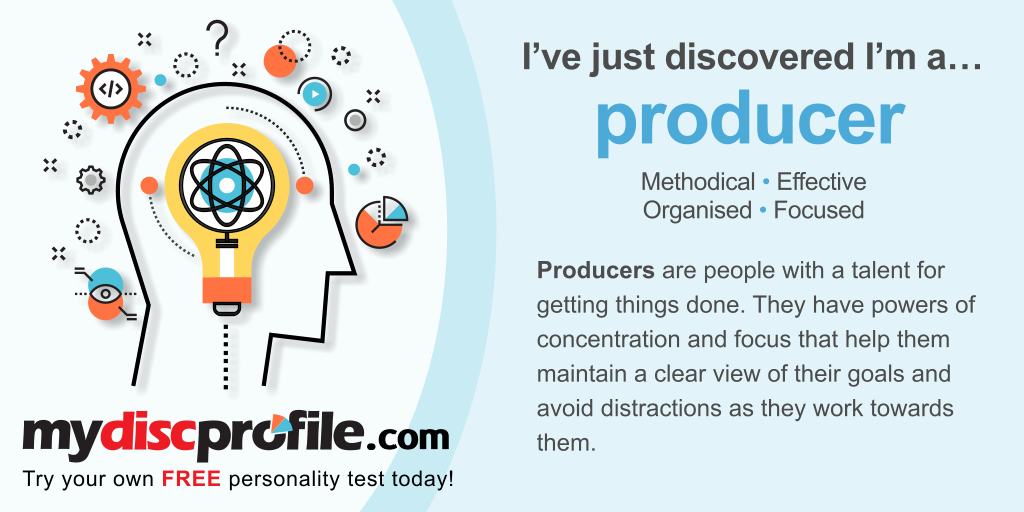Your Personality Report
stacey huish
Copyright © 1995-2024 Axiom Internet Group Limited. All rights reserved.
® myDISCprofile is an internationally registered trademark of Axiom Internet Group Limited
Your Personality Type:
Producer
Pace: Balanced Perspective: Balanced Focus: Events

You are a Producer. People like you have a talent for getting things done: your personality style combines a generally organised and dependable attitude with the capacity to take a more determined stance when a situation calls for it. You have powers of concentration and focus that help you maintain a clear view of your goals and avoid distractions as you work towards them.
Welcome to your mydiscprofile personality report

This report will give you some vital pointers to help you understand the way you currently behave, and to help you build an effective strategy to help you reach your goals.
We don't claim that this report can give you all the answers, but based on your responses to the mydiscprofile questionnaire, we hope you'll find some important insights and useful life tips in this report.
How to read your report
Important information about this report
 Don't skip this section!
Don't skip this section!
Your report has been compiled from your answers by an automatic process based purely on the answers you gave to the questionnaire. That means that it's completely objective, and it's also direct - in assessing your existing strengths, and also in making suggestions that might help you develop towards your goals.
While reading your report, it's important to be aware of a subtle effect that psychologists call confirmation bias. In the context of a report like this, that means that most people will tend to agree with the most positive comments about themselves, and reject less positive remarks. Often, though, it's exactly the suggestions that challenge preconceptions that are the most useful, so try to weigh the contents of the report accordingly.
That doesn't mean that we insist everything in this report must be true! The details given here are based on your answers to the questionnaire, and we hope you'll find them truly useful in helping to understand yourself, or at least give you some important topics to think about. However, the personalities of human beings are immensely variable - probably infinitely so - and a simple test like this can only cover a finite number of possibilities.
With all that in mind, we hope you find much in your report to engage your interest and suggest possibilities for the future.

Important: Don't skip this section!
If you want to get the most out of your mydiscprofile report, you'll want to take a few minutes to absorb the important information on this page.
About You
An introduction to your personal style
- Dependable
- Effective
- Efficient
- Researching
- Serious
- Matter-of-fact
- Problem-solving
- Orderly
- Stubborn
- Steady


What are the most basic elements of your personality?
We analyse the answers you gave to the questionnaire to work out the values for four fundamental factors in your personal style. From the combinations of these values, we can tell a great deal about your personality. These four most basic factors are shown in this graph:
Dominance
A measure of your directness and assertiveness, associated with a willingness to take risks and accept challenges. Dominance is a very important factor in your personal approach.
Influence
A measure of your sociability, openness and confidence with others. Influence is a relatively unimportant factor in your style.
Steadiness
A measure of your patience with others, and your readiness to take a thoughtful, long-term approach. Steadiness is a moderately important factor in your personal style.
Compliance
A measure of your interest in structure and order, and your willingness to comply with rules and regulations. You have a balanced attitude toward behaviour of this kind.
So, what does that mean in practice?
You have a resolute and determined approach to life. You're concerned with achieving success, in whatever terms you define it for yourself, and you're willing to do what you can to reach your goals. You tend to take life relatively seriously, and you can show quite a tenacious attitude when you're faced with obstacles or difficulties.
How are these scores calculated?

Your results are created from your answers to the mydiscprofile questionnaire using a profiling system known as DISC (from the initials of Dominance, Influence, Steadiness and Compliance). DISC is widely used in professional personal assessments, and mydiscprofile uses the same underlying theory to give you a personal report built using professional techniques.
What are your most important traits?
Some of the most prominent personality traits in your style are listed here:
Effectiveness
Having the determination and productivity to achieve your goals.
Resolution
Standing by your decisions and conclusions, even in the face of opposition.
Productivity
Focusing on practical issues and working to complete a task or project.
Resilience
Resisting distractions or obstacles to work through to the end of a task.
Responsibility
Taking a serious view of the needs of a situation.
Handy Hint
The word trait just refers to any distinct feature or element of your personality. If you're unsure about any of the terms used in this report, remember that you can always check the Glossary.

More about your general approach
Here's a selection of 'Style Keynotes' that highlight various important features of your personal style:
- Once you have set yourself to a task or project, your tenacious style means that you'll focus solidly on your goals in spite of almost any obstacles or objections.
- You deal well with stress and pressure, and your assertive style is well suited to situations that others would find difficult to deal with. You can cope relatively well with antagonism and with conflict, and you respond effectively to challenges.
- You're unconcerned about stating your views or opinions directly, and you'll expect others to be equally direct with you. You generally consider it important to be accurate and clear, even at the risk of causing offence, if you feel that your position is important enough to warrant it.
What are your most important values?
You value a sense of purpose, and you tend to be at your most motivated and active where you have a clear goal to work towards. Your approach can sometimes be relatively formal and blunt, especially in more challenging or pressured types of situations.
Values are an important feature of any personality, and you can find out more about your particular set of values in the 'Core Values' section later in this report.

How does your personal style compare with other people?
This chart divides personalities up into twenty-five blocks, and is set up in such a way that people are divided more-or-less equally across the chart (that is, each block generally contains about 4% of the population as a whole). We've marked the block that contains your style so you can see how it compares with the other possibilities.

Your Style
Your style is somewhat Receptive, and also somewhat Controlled.
Assertive
A measure of your willingness to take direct action, or to take charge of a situation. Assertiveness isn't a strong feature of your style.
Controlled
A measure of self-reliance, relating to an analytical and precise approach. This is a very strong feature of your personal style.
Open
A measure of a person's willingness to communicate freely and express their ideas. This kind of behaviour rarely appears in your personal approach.
Receptive
A measure of acceptance of others, and a readiness to show patience and caution. This feature is fairly well represented in your style.
What are 'Core Values'?
For most people, the driving forces behind their approach to life can ultimately be summed up in terms of a few brief concepts. These concepts are referred to here as 'Core Values': they're the internal 'signpost' we use to judge situations, and work out how to react to them.
For example, let's say you're a person who values 'Challenge'. If that's the case, you'll actively seek out situations that provide you with the challenging conditions you prefer, and avoid those that don't. You'll also tend to judge events and people depending on the extent to which they fulfil this particular need.
Positive and Negative
Core Values aren't always positive in their effects: they can have a negative impact, too. Events or developments that challenge these basic values can lead to responses ranging from disinterest to discomfort.
So, an understanding of the Core Values that lie at the heart of your personal approach to life can be extremely helpful in understanding how and why you react the way you do.
What are your 'Core Values'?
In this section, we've selected a few Core Values that closely match your own personal style. These are the kinds of values that underlie the way you look at life, and the way you form judgements about the events and people in your life.

Simplicity
You're a person who likes to concentrate on the heart of an issue, rather than concern yourself with complications or irrelevancies associated with it. You appreciate the straightforward and direct, and you'll tend to be drawn to ideas or situations that are clear of unnecessary distractions or challenges.
Efficiency
Results are important to you: once you've settled on a course of action, you like to work towards its completion as quickly as possible. However, you're also concerned with effectiveness and quality, so you'll rarely rush something simply to see it finished. This combination of urgency and caution makes you generally efficient, and so it's likely that you're not only a relatively organised person yourself, but also that you're prepared to organise those around you.
Responsibility
You're a person who's concerned with taking responsibility for your life and work, and you'll look for a similar level of personal accountability from other people, too. You have a keen sense of your own capabilities, and you enjoy an opportunity to use them to the full, but you're also ready to admit your limitations. You look for similarly self-aware approach in those around you, and you're not afraid to point out others' shortcomings when you think it necessary.
Abilities, Strengths, Limitations
Understanding the advantages, and the limits, of your style

Every different type of personality has its own distinctive strengths, and its own distinctive abilities that stem from those strengths. Those same strengths and abilities are always - without exception - balanced by limitations and disadvantages. The key to making the most of your personal style is understanding where your strengths and limitations lie. Armed with that knowledge, you can take maximum advantage of your strengths, while avoiding potential problems arising from your personal limits.
Strengths and Limitations
In this section, you'll find a breakdown of your most important areas of strength, each shown with all its related advantages, abilities and limitations.
![]() This symbol marks the strengths of each facet of your personality, areas where that aspect of your style gives you real advantages.
This symbol marks the strengths of each facet of your personality, areas where that aspect of your style gives you real advantages.
![]() This symbol marks the limitations that balance out of each of your strengths, describing conditions where your approach might be less effective.
This symbol marks the limitations that balance out of each of your strengths, describing conditions where your approach might be less effective.
Resolution
![]() Once you've made a choice, or settled on a decision, you have the combination of determination and assertiveness to help you work steadily towards your goals. After committing yourself to an objective, your dependable style means that you're rarely swayed from your target.
Once you've made a choice, or settled on a decision, you have the combination of determination and assertiveness to help you work steadily towards your goals. After committing yourself to an objective, your dependable style means that you're rarely swayed from your target.
![]() Though your strength of commitment can be effective, it's important that you don't become so absorbed in a goal that you're insensitive to other considerations. Your determination can verge on stubbornness at times, and it will help to remain flexible enough to consider others' suggestions or ideas.
Though your strength of commitment can be effective, it's important that you don't become so absorbed in a goal that you're insensitive to other considerations. Your determination can verge on stubbornness at times, and it will help to remain flexible enough to consider others' suggestions or ideas.
Efficiency
![]() You're a person who focuses on the practical questions involved in getting things done. You can focus closely on the details of an issue, and you combine formal organisational skills with a fairly assertive style, making you effective in achieving concrete results.
You're a person who focuses on the practical questions involved in getting things done. You can focus closely on the details of an issue, and you combine formal organisational skills with a fairly assertive style, making you effective in achieving concrete results.
![]() You can sometimes focus a little too strongly on the practical side of issues, and consequently consider the responses and feelings of other people less than might be appropriate.
You can sometimes focus a little too strongly on the practical side of issues, and consequently consider the responses and feelings of other people less than might be appropriate.
Resilience
![]() You're a person who copes well with difficulties and obstacles. You have a solid, resolute side to your personality which means that you can accept setbacks or rejection without being deterred. Though you're not as direct or assertive as some individuals, you do have a determined attitude and, once you've set your mind on a specific goal, you'll often succeed in achieving it.
You're a person who copes well with difficulties and obstacles. You have a solid, resolute side to your personality which means that you can accept setbacks or rejection without being deterred. Though you're not as direct or assertive as some individuals, you do have a determined attitude and, once you've set your mind on a specific goal, you'll often succeed in achieving it.
![]() In situations where you need to show a more adaptable approach, you may find that your determined resilience is more of a hindrance than a help. Sometimes, being ready to abandon an unsuccessful course actually is the best option, you'll find it useful to be more open to the possibility of taking new direction from time to time.
In situations where you need to show a more adaptable approach, you may find that your determined resilience is more of a hindrance than a help. Sometimes, being ready to abandon an unsuccessful course actually is the best option, you'll find it useful to be more open to the possibility of taking new direction from time to time.
Personal Development
Directions for change in your personal style
What is ‘personal development’?
As well as building a picture of your personality as it stands at the moment, the mydiscprofile questionnaire can also extrapolate from that picture to identify the kinds of changes or adaptations you'd likely want to see in your approach. These adaptations are typically due to your perceptions of how you ideally need to behave to fit into your current life situation.
Personal Development is the process of adapting your personal style to meet these perceived requirements. In this section, we look at the kinds of directions you seem to be wanting to develop your style (based on your answers to the mydiscprofile question set, of course). Where possible, we also offer a range of helpful advice to guide you towards those goals.
Changes shown in your results
The chart below shows the changes in terms of your four main personality factors: Dominance, Influence, Steadiness and Compliance. Larger bars indicate greater potential for change in your approach, for that particular factor. Bars pointing upward indicate that you're seeking to increase the factor in question, while bars pointing downward suggest that you're looking to decrease the factor's importance.
Judge for Yourself
The Personal Development guidelines discussed in this section are calculated from the results of your profile, but only you yourself are qualified to judge the extent they apply to your own situation. More than any other section of this report, it's important to treat these comments as objective advice, rather than definitive statements.

Dominance
There's a slight adjustment indicated in your Dominance value, but as this is already high, the change would be unlikely to be significant.
Influence
There's a very significant upward shift in Influence in your profile, meaning that you seem to be looking to show a much more outgoing and expressive style.
Steadiness
It appears that your current approach is seeking to adjust to a lower level of Steadiness, corresponding to a less patient and undemonstrative approach.
Compliance
In terms of the Compliance factor, it seems that you take a relatively balanced view, and are not seeking to increase or decrease it by a significant amount.
What these changes mean in practice
It seems that, if there's a single thing you could change about your personality, you'd like to see an increase in your social confidence. You seem to be concerned to communicate with others in a freer and more expressive manner, and to increase the level of positivity and sociability in your relationships with those around you.
Making a change
A useful way to approach change like this is to break it down into simple steps, and think about applying each of those steps in your work and home life. Based on this assessment of your personal development targets, these are some simple approaches to change that you might find effective:
- The development of a greater sense of openness is dependent on being readier to communicate without reservation or analysis. The more you are able to express yourself spontaneously and openly to others, the more your personality style will adapt to the confident style you seem to be seeking.
- You have something of a tendency to pause or hesitate before communicating with others. Overcoming this relatively cautious attitude is an important part of developing the more expressive style you seem to be wanting to work towards.
- The key feature of the approach you seem to be aiming for is spontaneity. When you find yourself considering the best option to take, rather than pausing to consider matters in detail, instead try following your most natural reaction.

Relating to Other People
Interacting with those around you
How do we relate to one another?
Relationships with others are probably the key component in any discussion of personality: in fact, how we perceive others, and how others perceive us, lie at the heart of what 'personality' means.
When it comes to relating to others, it's simply not possible to understand their motivations and intentions directly: instead, it's normal to consider others' behaviour through the filter of your own attitudes and presumptions. This 'filtering' effect can have an enormous effect on the way you understand others, and on the way that others see you.

Understanding others
In this section, we look at the most important aspects of your personality when it comes to understanding and judging those around you. These are the most important things you look for when you're interacting with others, and they also help to define the kinds of preconceptions you bring to bear in communication.
- You tend to apply a rather pragmatic approach to life in general, and this will necessarily affect the way that you approach and understand other people. Your style of communication is direct and to the point, and you rarely concern yourself with tact or diplomacy, preferring instead to state your views clearly and distinctly.
- You have a tendency to judge others based on your perceptions of their capabilities and effectiveness, rather than on more personal criteria. You're not particularly open in your style of communication, and you'll normally want to get to know someone well before you feel ready to trust them.
- One of the defining factors of your style is your resolutely deliberate approach. Your profile shows a relatively rare combination of assertive determination and steady reliability and, by comparison, it's likely that you often find others too quick to change their minds, or too ready to accept a compromise.
How others relate to you
Your own presumptions will necessarily affect your understanding of others' personal styles, but this is equally true of everyone else. In the same way that you tend to interpret others' attitudes in your own terms, those around you will also be applying their own 'filters' to your behaviour. Those filters can be extremely varied, and there isn't space to go into all the possible combinations here, but it is possible to make a few general comments.
- Others may find you difficult to relate to at times, especially in more pressured situations where you are at your most determined. You tend to focus on expressing your own point of view, and you can be quite demanding of others. There is a risk of this approach leading to misunderstanding or even antagonism, and it may be worthwhile to adopt a more receptive attitude where a situation allows.
- Though you're capable of direct and assertive behaviour when you feel that a situation demands it, you're also a relatively reserved and unforthcoming type of person, and that's especially true in more social situations. Because of that, others can often find it difficult to form a judgement about your style, and your uncommunicative attitude may lead some to an assumption that you have a rather brusque, indifferent approach to those around you.
- It's possible that others might find your assertive personal style a little difficult to approach at times. If you're concerned with truly understanding others' ideas, it will be worthwhile to assume a slightly more accepting attitude, to help encourage those around you to express themselves more openly.

Learning to communicate more effectively
For you, communication - and especially outgoing or expressive communication - tends to be a rather low priority. You tend to be more concerned with actually achieving your ends than interacting with others, and that's particularly true where you feel pressure to succeed. Because of this, you tend not to seek support from others.
This general attitude means that you may undervalue the contributions that others can offer you. Adopting a more inclusive and receptive attitude to the people around you can help to develop supportive connections, and bring practical advantages, too.
Your Work Style
How your personality affects the way you work
What is your ‘work style’?
Success in the work arena is as dependent on your personal style as any other aspect of life. In this section of your personal report, we look at the ways your particular defining characteristics will tend to affect the way you operate in a working environment. We also look at how you're likely to behave in some common working situations.
Your most important work skills
Every different personality type has its own associated set of work skills, and of course there are very many of these, depending on the detailed circumstances and the requirements of a particular job.
Here, we select some of the most important work skills suggested by your profile style.

Effectiveness
Your personal style includes a range of features that come together to help you achieve results. Though you're capable of focusing on goals, and working to reach them, you combine that with a more cautious and analytical side. That means that your decisions tend to be based on careful thought, and you also have the persistence to put them into practice even in difficult situations.
Resolution
You're not a person who's easily dissuaded from a task, and once you're committed to achieving a goal, you'll pursue that goal with tenacity. This determined feature of style is particularly effective at dealing with challenging situations, so that you cope well with stress, and you're also able to deal effectively with conflict or antagonism.
Resilience
You have an especially high concentration threshold, meaning that you have the capacity to work solidly and reliably at a task. This persistent element to your nature also means that you have a capacity to disregard distractions and overcome obstacles, a capacity that will be enhanced by the more directly assertive element of your personal style.
Leadership
Performance in a leadership role
Your leadership skills are likely to be most effective on a practical level. You're determined and efficient, but your style is less urgent and demanding than many similar types. You're open to constructive suggestions and proposals, but you're not a particularly communicative individual, and this may raise uncertainty within your team from time to time.

Teamwork
Performance as part of a team
You can be an effective and productive individual in most working situations, including those that involve group work. Your rather uncommunicative approach may cause problems in a team situation, as you tend to prefer not to explain your actions or decisions to others, so that you will probably find it helpful to develop a slightly more expressive approach towards other team members.

Planning Your Career
Finding a role that suits your personal style
What types of roles suit you best?
The key to successful career planning is to identify roles that match your natural abilities, so that they can provide a working environment where you not only feel engaged and motivated, but also make the most effective use of your natural talents. In this section, we look at some of the types of roles that will suit your style particularly well.
Remember that this analysis is based specifically on your personality style, and no other factors. Many of the roles or careers that we discuss here will also involve specialist interests, abilities or skills that lie outside the realm of this assessment. Those factors aside, these are the types of roles that match your particular personal approach.
Social & Legal
Roles in this area focus on an ability to work within a strict framework, but also a willingness to help others, to understand the needs of others and respond to those needs effectively.
Top matches in this area
- Customs Inspector
- Warden
- Security Guard
Agriculture & Environment
This category represents a range of roles related to environmental work. Work of this kind commonly needs a calm and patient attitude, while some more specialised roles have more particular needs.
Top matches in this area
- Agricultural Manager
- Farm Manager
- Environmental Engineer
- Landscape Architect
Production
Production is a broad term describing work associated with planning, control and quality assessment in general production work. Roles of this kind tend to focus on precision and efficiency.
Top matches in this area
- Quality Manager
- Engineering Manager
- Technical Director
- Production Manager
Health & Medicine
This area covers a wide range of roles with varying requirements for skill and knowledge, but generally needing a patient but resourceful approach and a professional attitude.
Top matches in this area
- Health Services Manager
- Dentist
- General Practitioner
Using this report in your CV

When preparing a CV (or résumé) many people include a short summary of their personal style as part of their self-description, and the contents of this report should be helpful in defining the type of information you could include in your own CV. If you want to create a self-summary like this, the following template is tailored to your personality style, and should provide a helpful starting point.
I'm a forthright and determined type of person, who has the personal motivation and self-disciple to work at a task or project until it is complete. I'm capable of taking an objective and dispassionate view of matters, and I'm capable of not only making decisions, but standing by those decisions when they're challenged.
You might also find it useful to list your most important personality traits. These are listed in the 'About You' section of this report but they are reproduced below for your convenience:
- Effectiveness
Having the determination and productivity to achieve your goals. - Resolution
Standing by your decisions and conclusions, even in the face of opposition. - Productivity
Focusing on practical issues and working to complete a task or project. - Resilience
Resisting distractions or obstacles to work through to the end of a task. - Responsibility
Taking a serious view of the needs of a situation.
Share mydiscprofile
Invite a friend to take their free personality test

Confirmation bias A common tendency to focus on comments that reinforce preconceptions, and disregard or reject those that challenge existing ideas.
Core value One of the most fundamental underlying values of a personality, from which actions and behaviours tend to ultimately originate.
Filter A series of expectations and presumptions applied by one person to another's behaviour, based on their own personal style.
Role A set of expected or required behaviours related (for example) to a particular job.
Trait A general term for any identifiable factor or element of the personality.
TWLR-YZ93-8Y5A-SX
You can use this Report Code to optionally transfer your report into a myDISCprofile Manager account.
myDISCprofile Manager gives business users a whole host of tools for managing personality results for commercial assessment, including free job matching and free group profiling.
myDISCprofile Manager will manage profiling and results for you, sending out questionnaires and keeping your reports organised. It includes a range of extra reports, too, covering topics like motivation or remote working.
You can find out more about the Manager service here ![]()
Sorry, there was a problem sending your report. You can retry if you wish. If you think there may be a problem with the address you originally entered, please contact us directly with the correct e-mail address.
When you originally upgraded this report, you will have been sent a receipt by e-mail, including a copy of the report in PDF format. If you need a copy of that receipt message, use the button below and we'll send a copy to the e-mail address you entered when you originally created your profile.
Processing your request. Please wait...
Your receipt copy has been sent to your e-mail address and should arrive shortly. If it does not appear in your inbox, remember to check other possible locations, such as your 'spam' folder.

